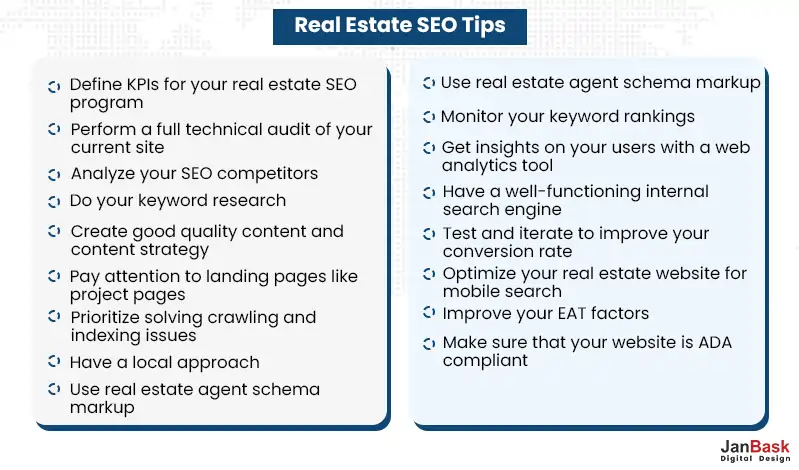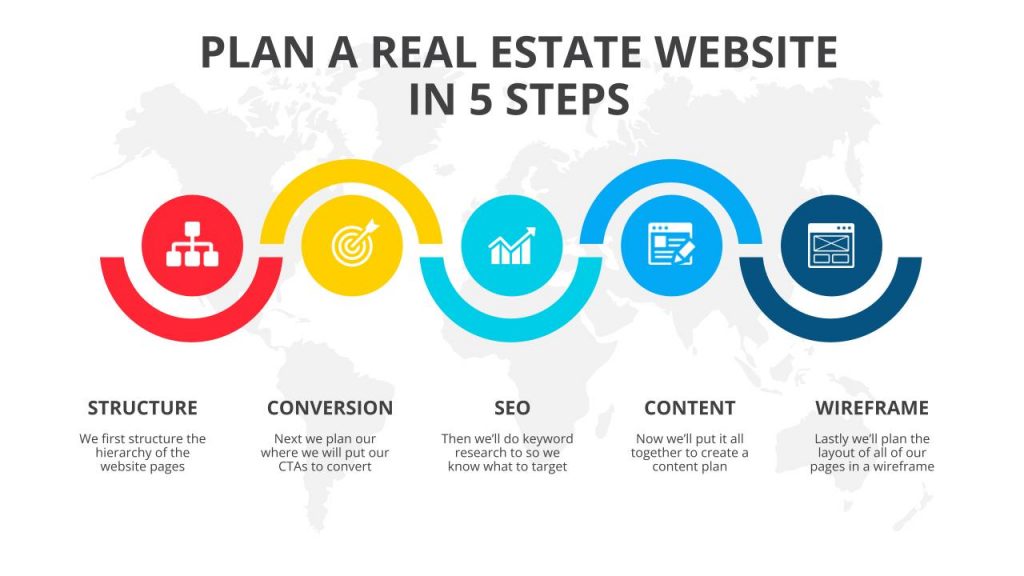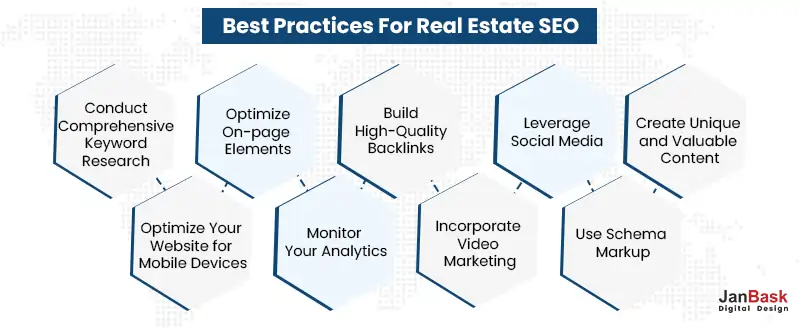Revamp your real estate site with these must-have SEO strategies for maximum online visibility and lead generation success.

Image courtesy of via DALL-E 3
Table of Contents
Introduction to SEO for Real Estate Sites
In the vast world of the internet, standing out can be quite a challenge. Just like how you search for the best hiding spot during a game of hide-and-seek, websites also need to be found by people searching online. This is where SEO comes in!
What is SEO?
SEO, which stands for Search Engine Optimization, is like a magical spell that helps websites appear higher up in the search results when someone looks for something on search engines like Google. It’s like making your website shine brightly so that others can easily spot it among all the other websites out there.
Why Real Estate Sites Need SEO
Now, think of SEO as a special tool that real estate websites use to attract more visitors and potential buyers. By using SEO strategies, real estate sites can increase their visibility and reach more people who are looking to buy or rent a new home. It’s like putting up a big sign that says, “Hey, check out this awesome house!” for everyone to see.
Understanding Keywords
Keywords are like signposts that help people find information on the internet. They are specific words or phrases that are used in web searches to locate relevant content. For example, if someone is looking for a house for sale in a particular area, they might type in keywords like “house for sale in [name of the area].” These keywords guide them to websites that contain the information they seek.
How to Choose the Right Keywords
When selecting keywords for a real estate website, it’s essential to think about what potential visitors are likely to search for. Consider using keywords that are relevant to the properties you are listing, such as “luxury homes,” “affordable apartments,” or “commercial spaces.” Conducting keyword research to identify popular search terms in the real estate industry can help you choose the most effective keywords for your site.
Using Keywords Effectively
Once you’ve identified the right keywords, it’s crucial to use them strategically throughout your website’s content. Incorporate keywords in the titles, headings, and descriptions of your web pages to signal to search engines what your site is about. By using keywords effectively, you can improve your site’s visibility in search results and attract more visitors interested in real estate properties.
Optimizing On-Page Elements
In order to boost the visibility of your real estate website and attract more potential buyers, it’s essential to optimize various on-page elements. Let’s dive into some key strategies that can help make your site more search engine friendly.

Image courtesy of via Google Images
Meta Titles and Descriptions
Meta titles and descriptions are crucial elements that appear on search engine results pages (SERPs). These snippets of text provide a brief preview of what a page is about. When creating meta titles and descriptions for your real estate site, be sure to include relevant keywords that accurately reflect the content. This will not only help improve your site’s visibility in search results but also entice users to click through to your site.
Headers and Subheaders
Headers (H1, H2, etc.) play a vital role in organizing your content and enhancing readability. Search engines use headers to understand the structure of your web page and prioritize important information. By using headers and subheaders effectively, you can make it easier for both users and search engines to navigate your site. Remember to include relevant keywords in your headers to further enhance your SEO efforts.
Content Quality
High-quality, relevant content is key to engaging visitors and improving your site’s SEO. When creating content for your real estate website, focus on providing valuable information that is useful to your target audience. Incorporate relevant keywords naturally throughout your content to enhance its visibility in search results. By consistently producing high-quality content, you can establish authority in your niche and attract more visitors to your site.
Creating Valuable Content
Creating valuable content is essential for real estate websites to attract visitors and keep them engaged. Whether it’s through blog posts, property descriptions, or visual content, providing valuable information can set your site apart from the competition.
Writing Blog Posts
When it comes to writing blog posts for your real estate website, remember to focus on topics that are relevant and interesting to your audience. You can share tips on buying or selling a home, highlight local events or attractions, or showcase success stories from your clients. By providing valuable information in your blog posts, you can establish yourself as a trusted authority in the real estate industry.
Crafting Property Descriptions
Property descriptions play a crucial role in attracting potential buyers to your listings. When crafting property descriptions, be sure to highlight the key features of the property, such as the number of bedrooms and bathrooms, unique amenities, and the neighborhood’s attractions. Use descriptive language to paint a vivid picture for your readers and make them envision themselves living in the property.
Using Visual Content
Visual content, such as images and videos, can enhance your website’s content and make it more engaging for visitors. When including visual content on your site, make sure the images are high-quality and showcase the best features of the properties. Videos can give viewers a virtual tour of the property and help them get a feel for the layout and design. By utilizing visual content effectively, you can capture the attention of potential buyers and keep them browsing your site for longer.
Mobile Optimization
In today’s digital age, having a mobile-friendly website is crucial for attracting visitors and potential buyers to your real estate site. With more and more users browsing the web on their smartphones and tablets, optimizing your site for mobile devices is a must.

Image courtesy of via Google Images
Why Mobile Optimization Matters
Did you know that a large percentage of users access websites through their mobile devices? That’s right! So, it’s essential to provide a good user experience for those visitors. If your site is not mobile-friendly, users may have a hard time navigating it, which can lead to them leaving and going to a competitor’s site.
Responsive Design
Responsive design is a key component of mobile optimization. It means that your website will adjust its layout and content to fit any screen size, whether it’s a small smartphone or a larger tablet. This ensures that your site looks good and is easy to use no matter what device your visitors are using.
Testing Mobile Friendliness
Testing if your website is mobile-friendly is easy! There are tools available online that can help you check how your site appears on different devices. If your site needs improvement, you can work on making adjustments to ensure that it provides a seamless experience for all visitors, regardless of the device they are using. Remember, happy users are more likely to stay on your site and explore your real estate listings!
Building Quality Backlinks
Backlinks play a vital role in boosting a real estate website’s search engine optimization (SEO) efforts. They are like upvotes from other websites, indicating to search engines that your site is trustworthy and relevant. Let’s delve into the world of backlinks and how to obtain quality links for your real estate site.
What are Backlinks?
Backlinks, also known as inbound links, are links from other websites that direct users to your site. Search engines view backlinks as signals of credibility and authority. The more high-quality backlinks your real estate site has, the higher it is likely to rank in search results.
Finding Link Opportunities
One way to obtain backlinks is through link building. Look for opportunities to get links from reputable and relevant websites. For real estate sites, consider reaching out to industry-related blogs, local business directories, or partnering with local businesses to exchange links.
Creating Shareable Content
Another effective way to attract backlinks is by creating valuable and shareable content. When you produce high-quality blog posts, infographics, or videos that resonate with your audience, other websites are more likely to link back to your content. Focus on providing unique and insightful information that others in the real estate industry would find valuable.
Leveraging Social Media and Local SEO
Social media platforms like Facebook, Instagram, and Twitter can be powerful tools to drive traffic to your real estate website. By sharing your listings, blog posts, and engaging content on social media, you can attract more potential buyers and sellers to your site. Additionally, social media activity can increase your website’s visibility and help improve your search engine rankings.

Image courtesy of via Google Images
Local SEO Strategies
Local SEO is crucial for real estate websites looking to attract clients in their specific area. By optimizing your website for local searches, you can ensure that potential clients in your target location can easily find you online. This involves listing your business on platforms like Google My Business, using location-specific keywords, and ensuring that your contact information is consistent across all online directories.
Engaging with the Local Community
Engaging with the local community online can help boost your reputation, drive local traffic to your website, and establish you as a trusted real estate expert in your area. Participating in local community groups, hosting virtual events, or sponsoring local charities are all great ways to connect with potential clients and build relationships within your community.
Measuring and Tracking SEO Success
In the world of real estate websites, it’s not just about implementing SEO strategies, but also about measuring and tracking their success to ensure they are effective. By keeping an eye on key metrics and using analytics tools, you can gain valuable insights into the performance of your SEO efforts and make data-driven decisions to improve them.
Important SEO Metrics
When it comes to measuring SEO success, there are several key metrics that you should pay attention to. These metrics provide valuable information about the performance of your website and the effectiveness of your SEO strategies. Some of the most important SEO metrics include:
- Organic Traffic: This metric tracks the number of visitors who come to your website through organic search results. An increase in organic traffic indicates that your SEO efforts are driving more visitors to your site.
- Keyword Rankings: Monitoring the rankings of your target keywords in search engine results pages (SERPs) is crucial to assess the visibility of your website. Improvements in keyword rankings can lead to higher search engine visibility.
- Click-Through Rate (CTR): CTR measures the percentage of users who click on your website link in search results. A high CTR indicates that your website’s meta titles and descriptions are effective in attracting clicks.
- Conversion Rate: This metric tracks the percentage of website visitors who take a desired action, such as filling out a contact form or making a purchase. A high conversion rate indicates that your website is effectively converting visitors into leads or customers.
Using Analytics Tools
Analytics tools play a crucial role in measuring and tracking the success of your SEO strategies. One of the most widely used analytics tools is Google Analytics, which provides comprehensive data about your website’s performance and user behavior. By leveraging analytics tools like Google Analytics, you can gain insights into:
- Visitor demographics: Understand the characteristics of your website visitors, such as their age, gender, and location.
- Site traffic: Track the number of visitors to your website, pages they visit, and how they found your site.
- Conversion tracking: Monitor the performance of your website in terms of lead generation and sales conversion.
- Behavior flow: Visualize how users navigate through your website and identify any bottlenecks in the user journey.
Adjusting Strategies Based on Data
Once you have collected data and analyzed the performance of your SEO strategies, it’s essential to make adjustments based on the insights gained. By continually monitoring key metrics and analyzing trends over time, you can identify areas for improvement and optimize your SEO efforts for better results.
For example, if you notice that certain keywords are not performing well or that certain pages have a high bounce rate, you can take action to optimize those keywords or improve the content on those pages. By making data-driven decisions and adjusting your strategies accordingly, you can continually improve the effectiveness of your SEO efforts and drive more traffic to your real estate website.
Conclusion and Summary
In conclusion, implementing effective SEO strategies is crucial for real estate websites to increase visibility, attract more visitors, and ultimately drive more sales. By optimizing keywords, on-page elements, content, mobile experience, backlinks, social media presence, and local SEO, real estate sites can significantly improve their online performance.

Image courtesy of via Google Images
Recap of Key Strategies
We discussed the importance of researching and optimizing keywords, crafting high-quality content, ensuring mobile optimization, building quality backlinks, leveraging social media and local SEO, and measuring SEO success through analytics tools. These strategies work together to enhance a real estate website’s online presence and attract potential buyers.
Encouragement to Implement
It is essential for real estate professionals to start implementing these SEO strategies to stay competitive in the digital landscape. By focusing on SEO, they can improve their website’s visibility, engage with their target audience, and ultimately drive business growth. Remember, consistency and patience are key to seeing long-term success with SEO efforts.
Want to turn these SEO insights into real results? Seorocket is an all-in-one AI SEO solution that uses the power of AI to analyze your competition and craft high-ranking content.
Seorocket offers a suite of powerful tools, including a Keyword Researcher to find the most profitable keywords, an AI Writer to generate unique and Google-friendly content, and an Automatic Publisher to schedule and publish your content directly to your website. Plus, you’ll get real-time performance tracking so you can see exactly what’s working and make adjustments as needed.
Stop just reading about SEO – take action with Seorocket and skyrocket your search rankings today. Sign up for a free trial and see the difference Seorocket can make for your website!
Frequently Asked Questions (FAQs)
How Long Does SEO Take to Show Results?
SEO is like planting a seed that takes time to grow into a beautiful flower. It’s a long-term strategy that requires patience. Results may not be immediate and could take a few months to start showing. Remember, good things come to those who wait!
What is the Best Way to Learn More About SEO?
If you’re curious about diving deeper into the world of SEO, there are many resources available online. You can explore online courses, read blogs, and participate in forums dedicated to SEO. These resources can provide valuable insights and help you become an SEO whiz!
Do I Need to Hire an SEO Expert?
While learning about SEO can be exciting, sometimes it’s beneficial to bring in an expert. If you find SEO overwhelming or don’t have the time to dedicate to it, hiring an SEO expert could be a wise decision. They can analyze your website, devise strategies, and help you climb the SEO ladder faster. However, if you enjoy the challenge and have the time, you can definitely tackle SEO on your own!







